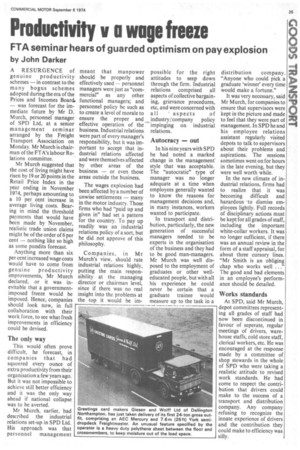Productivity v a wage freeze
Page 27

If you've noticed an error in this article please click here to report it so we can fix it.
FTA seminar hears of guarded optimism on pay explosion
by John Darker
A RESURGENCE of genuine productivity schemes — in contrast to the many bogus schemes adopted during the era of the Prices and Incomes Board. — was forecast for the immediate future by Mr D. Murch, personnel manager of SPD Ltd, at a senior management seminar arranged by the Freight Transport Association on Monday. Mr Murch is chairman of the FTA's labour Relations committee.
Mr Murch suggested that the cost of living might have risen by 19 or 20 points in the Retail Price Index in the year ending in November 1974, perhaps amounting to a 10 per cent increase in average living costs. Bearing in mind the threshold payments that would have been made by November, realistic trade union claims might be of the order of 6 per cent — nothing like so high as some pundits forecast. Anything more than six per cent increased wage costs would have to come from genuine productivity improvements, Mr Murch declared, or it was inevitable that a governmentimposed freeze would be imposed. Hence, companies should look now, in full collaboration with their work force, to see what fresh improvements in efficiency could be devised.
The only way
This would often prove difficult, he forecast, in companies that had squeezed every ounce of extra productivity from their organisation a few years ago. But it was not impossible to achieve still better efficiency and it was the only way ahead if national collapse was to be averted.
Mr Murch, earlier, had described the industrial relations set-up in SPD Ltd. His approach was that personnel management meant that manpower should be properly and effectively used personnel managers were just as "commercial" as any other functional managers; and personnel policy be such as to create a level of morale to ensure the proper and effective operation of the business. Industrial relations were part of every manager's responsibility, but it was important to accept that industrial relations affected and were themselves affected by other areas of the business — or even those areas outside the business.
The wages explosion had been affected by a number of unwise settlements — many in the motor industry. Those firms who had "paid up and given in" had set a pattern for the country. To pay up readily was an industrial relations policy of a sort, but he did not approve of this philosophy.
Companies, in Mr Murch's view, should rate industrial relations highly, putting the main responsibility at the managing director or chairman level, since if there was no real insight into the problems at the top it would be im possible for the right attitudes to seep down through the firm. Industrial relations comprised all aspects of collective bargaining, grievance procedures, etc, and were concerned with all ' aspects of industry/ company policy — impinging on industrial relations.
Autocracy — out
In his nine years with SPD he had noted a marked change in the management' style that was acceptable. The "autocratic" type of manager was no longer adequate at a time when employees generally wanted to know the reasons for management decisions and, in many instances, workers wanted to participate. In transport and distribution, particularly, the new generation of successful managers needed to be experts in the organisation of the business and they had to be good man-managers. Mr Murch was well disposed to the employment of graduates or other welleducated people, but with all his experience he could never be certain that a graduate trainee would measure up to the task in a distribution company. "Anyone who could pick a graduate 'winner' every time would make a fortune."
It was very necessary, said Mr Murch, for companies to ensure that supervisors were kept in the picture and made to feel that they were part of management. In SPD he and his employee relations assistant regularly visited depots to talk to supervisors about their problems and aspirations. The sessions sometimes went on for hours in the late evening, but they were well worth while.
In the new climate of industrial relations, firms had to realize that it was becoming difficult and hazardous 'to dismiss employees lightly. Full records of disciplinary actions must be kept for all grades of staff, including the important white-collar workers. It was no longer sufficient, if there was an annual review in the form of a staff appraisal, for about three cursory lines. "Mr Smith is an obliging chap who works well . ." The good and bad elements in an employee's performance should be detailed.
Works standards
At SPD, said Mr Murch, depot committees representing all grades of staff had now been discontinued in favour of seperate, regular meetings of drivers, warehouse staffs, cold store staff, clerical workers, etc. He was encouraged at the response made by a committee of shop stewards in the whole of SPD who were taking a realistic attitude to revised work standards. He had come to respect the contribution that drivers could make to the success of a transport and distribution company. Any company refusing to recognize the innate experience of drivers and the contribution they could make to efficiency was silly.


























































































































































